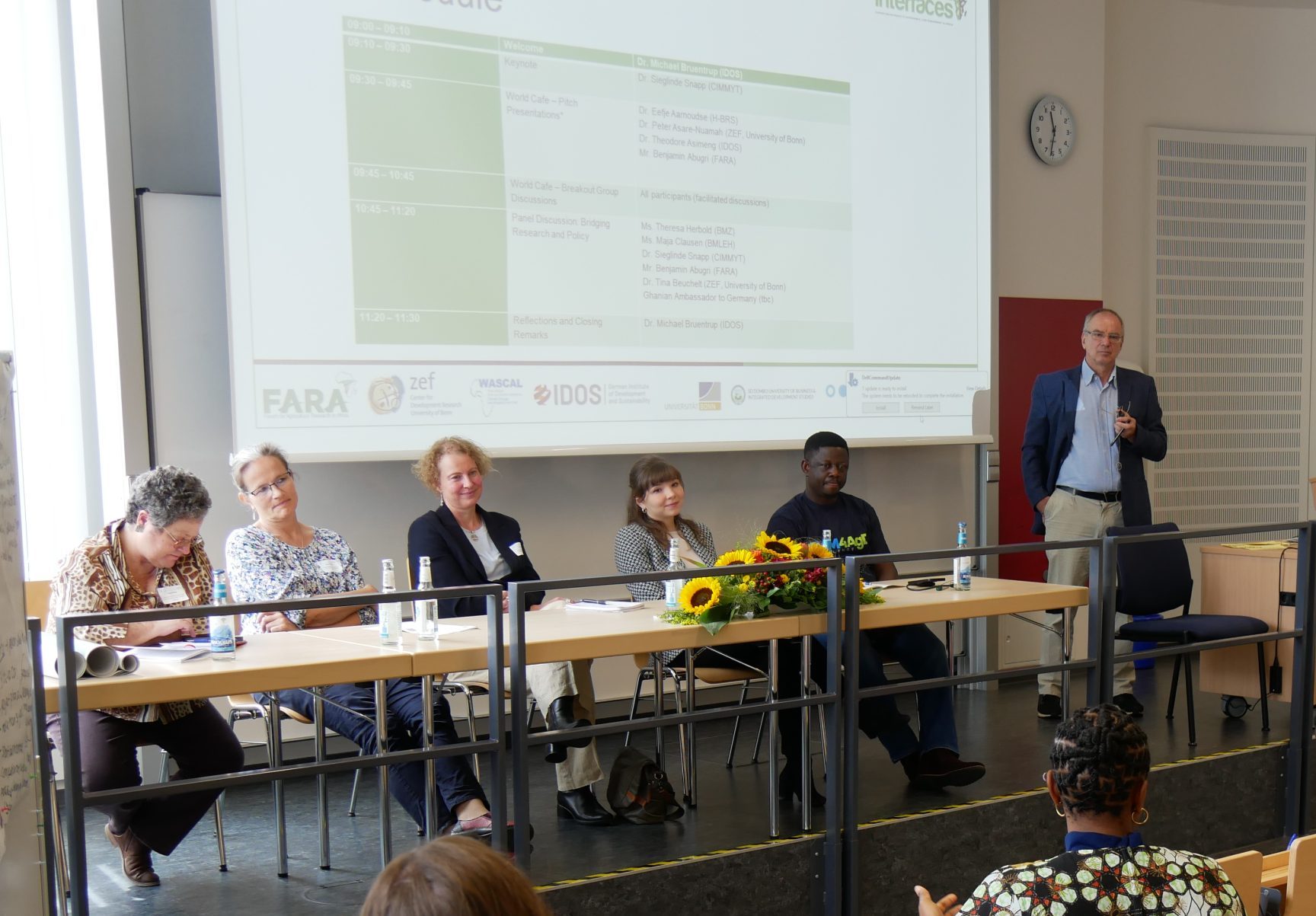By: Benjamin Abugri (KM Specialist, FARA)
On Wednesday, 10 September 2025, I had the privilege of participating in the INTERFACES Side Event at Tropentag 2025, hosted at Bonn University under the theme “Bridging the Gap: Strengthening Science-Policy Interfaces in Agricultural Research.” The event brought together researchers, policymakers, and development practitioners from Africa and Europe to reflect on how scientific knowledge can more effectively shape and inform policy processes. The workshop built on previous Tropentag conversations on participatory research and agricultural knowledge management, and it offered a platform to deepen the dialogue around bridging research, policy, and practice.

As part of the panel, which included representatives from FARA, BMZ, BMLEH, CIMMYT, ZEF, and IDOS, I was invited to share an African perspective on what works in strengthening the relationship between science and policy. In my intervention, I emphasised the importance of trust as the foundation of effective collaboration. Trust is built through recognition of mutual roles, investment in relationships, and creating shared opportunities. Without it, even the best-intentioned efforts at policy influence risk being undermined by suspicion or lack of ownership.
I argued that the need for deliberate and continuous engagement that brings everyone to the table is equally critical. Science-policy dialogue in Africa must not remain the preserve of researchers and policymakers alone. Farmers, academics, civil society actors, traditional authorities, youth, children, and women all hold knowledge and perspectives that enrich policymaking. Platforms such as Communities of Practice, Innovation Platforms, and, more recently, the Participatory Learning Platform piloted by the INTERFACES Project, offer concrete models for structuring inclusive collaboration. Such spaces create shared ownership of knowledge and allow diverse actors to contribute meaningfully to the agricultural transformation agenda.

I also reflected on the inevitability of change. Agricultural systems, like policy landscapes, are dynamic and continually shaped by shifting demands, emerging challenges, and new technologies. Bridging the science–policy gap, therefore, requires agility. It is not enough to establish dialogue; we must be willing to review, adapt, and adopt approaches that respond to the realities of our time. This adaptability ensures that knowledge remains relevant and actionable, rather than static and outdated.
Beyond the panel, I also facilitated a World Café session that focused on strengthening knowledge exchange and Communities of Practice in Africa. The discussions were guided by questions drawn from the Knowledge Management for Agricultural Development (KM4AgD) Agenda and the Accra Declaration. Participants reflected on how African institutions can better institutionalise knowledge exchange by embedding it within their core strategies, such as developing national KM policies, creating dedicated KM roles, and providing incentives that encourage continuous learning. They explored how Communities of Practice could be made more inclusive and impactful by ensuring that they embrace policymakers, farmers, and indigenous knowledge holders. The group also deliberated on how digital platforms such as FARADataInformS and AARIEIspace can be harnessed sustainably, with attention given to issues of interoperability, governance, and the fight against misinformation.

The feedback from participants was both rich and instructive. There was broad recognition that institutionalising knowledge management is no longer optional, particularly now that it features prominently in the Kampala Declaration and the CAADP Action Plan 2026–2035. Many also highlighted the need to clearly define what we mean by “farmer” in policy dialogues, to avoid blanket assumptions and ensure inclusivity. Others urged greater use of visuals in knowledge communication, emphasising that long, text-heavy materials are less effective in engaging diverse stakeholders. A recurring theme was the urgency of overcoming the fragmentation of digital platforms and removing barriers to accessing knowledge by working towards interoperability, so that knowledge can flow more seamlessly across Africa’s agricultural research and policy landscape.
The INTERFACES Side Event at Tropentag 2025 was an opportunity to exchange perspectives and reaffirm the centrality of knowledge management and communities of practice in driving agricultural transformation. It reinforced the conviction that Africa must invest in strong, inclusive, and adaptive knowledge ecosystems. Such ecosystems will ensure that research does not remain in silos but actively informs policy and practice, ultimately contributing to a more sustainable and prosperous agricultural future.






Leave A Comment